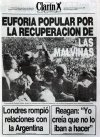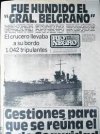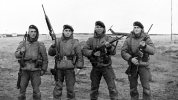It is January 1, 1979, Argentina almost started a war with Chile over the territory of the Beagle and the Strait of Magellan on December 22, 1978. A conflict that was resolved diplomatically with the intervention of Pope John Paul II, Videla knew that this conflict could have made military rule very popular, but it was not feasible to start it... "yet."
What other way was there to increase the popularity not only of the regime but also of the country? Little by little, the disappearances of the subversive groups became known and one or another clandestine center was discovered. What could distract people enough that his plan to disappear and finish them off wouldn't fail? the Falklands,
Malvinas, a very patriotic and sensitive issue in Argentine society. If he managed to get them back, Argentine society would love him, no, adore him.
But he knew that doing so would not only pit him against the United Kingdom and the United States.
Reluctantly, he learned that his only avenue for help was the Soviet Union.
Since November 1979 he would secretly begin training with the armed forces that would last until 1981, he knew that Galtieri was useless and that he would spoil his plan. By continuing as leader of the military Junta, he would cause instability in it, which would lead to problems in the future.
Could Videla carry out his plan?
Relations between Chile and Argentina were weak, both countries feared that the conflict over the Strait of Magellan would reappear.
The persecution of the subversive groups continued. Thanks to the boycott that various organizations carried out in the country in the 1978 World Cup, the "illegal" activities of the military junta began to be public knowledge while the Pinochet dictatorship had the approval of NATO and especially the CIA. .
The first suspicions of an operation to recover the islands began when the purchase of three Mirage M-III E aircraft and 4 Mirage IAI M 5 Dagger aircraft was discovered, the United States intelligence services were monitoring Argentine purchase activities.
Videla managed to convince the US high command that they bought it to "fight subversion more efficiently."
Follow the thread to find out and give your opinions for the story.
I promise to update constantly.
What other way was there to increase the popularity not only of the regime but also of the country? Little by little, the disappearances of the subversive groups became known and one or another clandestine center was discovered. What could distract people enough that his plan to disappear and finish them off wouldn't fail? the Falklands,
Malvinas, a very patriotic and sensitive issue in Argentine society. If he managed to get them back, Argentine society would love him, no, adore him.
But he knew that doing so would not only pit him against the United Kingdom and the United States.
Reluctantly, he learned that his only avenue for help was the Soviet Union.
Since November 1979 he would secretly begin training with the armed forces that would last until 1981, he knew that Galtieri was useless and that he would spoil his plan. By continuing as leader of the military Junta, he would cause instability in it, which would lead to problems in the future.
Could Videla carry out his plan?
Relations between Chile and Argentina were weak, both countries feared that the conflict over the Strait of Magellan would reappear.
The persecution of the subversive groups continued. Thanks to the boycott that various organizations carried out in the country in the 1978 World Cup, the "illegal" activities of the military junta began to be public knowledge while the Pinochet dictatorship had the approval of NATO and especially the CIA. .
The first suspicions of an operation to recover the islands began when the purchase of three Mirage M-III E aircraft and 4 Mirage IAI M 5 Dagger aircraft was discovered, the United States intelligence services were monitoring Argentine purchase activities.
Videla managed to convince the US high command that they bought it to "fight subversion more efficiently."
Follow the thread to find out and give your opinions for the story.
I promise to update constantly.
Last edited:


